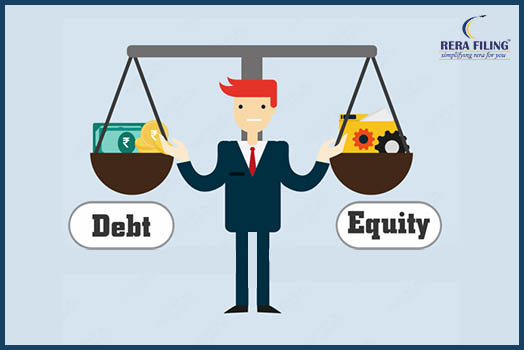Debt Funds V/S Equity Funds

- Thursday 16th May 2019
- Author: Shreya Uppal
Highlights
For far too long, there has been much confusion and debate over where one should invest either in Equity Funds (also known as Equity Mutual Funds) or Debt Funds (also known as Debt Mutual Funds). To allocate the assets in an optimum way, an investor must know the difference between the two.
Major differences between debt and equity funds has been mentioned below:
For far too long, there has been much confusion and debate over where one should invest either in Equity Funds (also known as Equity Mutual Funds) or Debt Funds (also known as Debt Mutual Funds). To allocate the assets in an optimum way, an investor must know the difference between the two.
Debt Funds
It is a type of mutual fund which raises money from the public and then invests a major portion of this amount in various fixed income earning investments like Govt. Bonds, RBI Bonds, and other highly rated securities.
Equity Funds
An equity fund, also known as a stock fund, is a type of mutual fund that invests shareholder’s money principally in stocks. The equity funds are principally categorized according to company size, the investment style of the holdings in the portfolio and geography.
Major differences between debt and equity funds are:
|
Basis |
Debt Fund |
Equity Fund |
|
1. Nature of the Fund |
In Debt funds, the money pooled from people is invested in fixed income instruments like government bonds, corporate bonds, non-convertible debentures, and other highly-rated instruments. |
In Equity funds, the money raised from investors is put into equity and equity-linked instruments. For example, if a fund invests more than 65 percent of their portfolio in stocks, they are generally considered as equity funds. |
|
2. Risk Factor |
The debt funds which usually invest in Fixed Income earning investments are safer as compared to equity funds. |
Equity funds are riskier as compared to debt funds. Equity securities are volatile by nature and sensitive to economic factors like Inflation, Tax rates, bank policies, etc. |
|
3. Returns |
Debt funds give steady returns but in a constant range. Since debt funds invest money in treasury bonds, there’s much less risk associated with them. These funds are a good investment option when the market is volatile. |
Equity Mutual Funds give good returns over the long period of time as compared to debt funds. However, the possibility of losses and negative returns is also higher when the market is volatile. These funds are good when the markets are booming. |
|
4. Taxability |
Refer Table below |
Refer Table below |
To understand the Taxability of Debt and Equity funds we must have a look at the table below:
|
Type of Fund |
Period of Holding |
Tax Rate |
|
1. Equity Mutual Fund |
Less than 12 months i.e. Short Term |
15% |
|
2. Equity Mutual Fund |
12 months or more i.e. Long Term |
Tax-free |
|
3. Debt Mutual Fund |
Less than 36 months i.e. Short Term |
As per Slab Rate of an assessee |
|
4. Debt Mutual Fund |
36 months or more i.e. Long Term |
20% with Indexation |
More Articles
- Online Listing Tips for Real Estate Agents
- How to start a Real Estate business in India - a complete guide !
- Renting Vs Buying property - How will you decide?
- What you should do in Property Management services
- Home Loan Insurance
- How to choose your builder?
- How to ensure fire safety in your home!
- Tips To Keep In Mind While Taking A Home On Rent
- Importance of Home Security
- How to plan your property budget?
- Leased vs. Purchased vs. Co-Working Office Spaces
- Easy Tips to Build an Eco Friendly Home
- Sample Flat - A Trick by a Builder?
- How to have a Beautiful Guest Room? Impress your Guests with these Guest Room Ideas..
- Understanding MCLR and its Effects on Home Loans
- 5 simple ways to close a real estate deal
- Is it worth to buy property near an airport ?
- Home loan tax benefit
- How to be successful in business as an introvert
- Cost effective home decor ideas
- What to Be-Paying Guest or a Tenant??
- Complete guide to start your small business
- Sports township- New trend in India
- Online Listing Tips for Real Estate Agents
- Understanding Floor Area Ratio- FAR
- Town and Country Planning | Meaning and Importance
- Checklist of Important Property Documents- All You Need to Know
- Role of CREDAI in real estate
Copyright © 2023 RERA Filing. All rights reserved.
 Rera
Act
Rera
Act
 Maharashtra
Maharashtra Karnataka
Karnataka Andhra Pradesh
Andhra Pradesh Uttar Pradesh
Uttar Pradesh